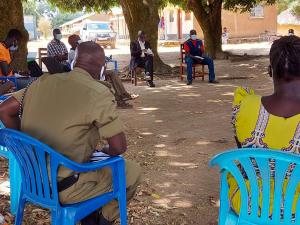Partner coordination Contributes to Better COVID-19 Vaccination Coverage in Kasese District
As the COVID-19 vaccination gains momentum in various districts of Uganda, financial, material, human, and logistical resources are becoming increasingly scarce due to the prolonged nature of the pandemic. However, innovative health workers have continued implementing mitigating measures to ensure the COVID-19 vaccination exercise succeeds in the low-resourced environment.
Aware of the implementing partners operating in the district under various sectors, district authorities supported by the World Health Organization (WHO) field team initiated coordination meetings that have helped to address the resource shortfall and duplication challenges affecting the vaccination exercise. In addition to being an appropriate forum for division of responsibilities, these meetings have enabled authorities in Kasese district to collectively identify key challenges affecting COVID-19 vaccination and devise means to tackle them.
However, these coordination meetings are not entirely new in Kasese District, they were instrumental during the Ebola Virus Disease outbreak in the neighbouring Democratic Republic of Congo which spilled into Uganda. Besides, Kasese district has WHO field team presence dating back to EVD time, with a wealth of experience in partner coordination gleaned from various emergency operations.
"Coordination of partners is not difficult in this district because of the 4Ws matrix that we developed and used during the Ebola epidemic. This matrix that shows us Who, What, Where, and When has strengthened the current system in addition to the district using a community-led approach structure," said the District Health Officer, Dr. Yusuf Baseka.
“Therefore, subsequent meetings have been about tangible contributions, allocation of activities for implementation, and avoidance of duplication to ensure wide and effective vaccination coverage. All able and willing partner organizations were assigned responsibilities which they have undertaken successfully,” he further notes.
Some of the outstanding contributions from the partner coordination meeting include 500 litres of fuel from the International Rescue Committee (IRC), vehicles to transport the vaccination teams to the sites from MSF and WHO, and printing of the consent forms. Baylor has promised to support the district with airtime for four radio talk shows and has printed 3000 copies of Information, Education, Communication (IEC) materials for distribution.
The Rwenzori Centre for Research and Advocacy supported the district with 200,000 shillings towards the purchase of internet data bundles that facilitated data capture into the District Health Information System.
As of 15th April 2021, 3621 health workers, teachers, people above 18 years with underlying health conditions had been vaccinated. This has been due to the unwavering support and contribution of the well-coordinated implementing partners based in the district.
In addition, Kasese District authorities have not only been exemplary in coordinating implementing partners but have also led the vaccination exercise by example. At the launch of the vaccination in the district, the Resident District Commissioner, the District Health Officer, the District Surveillance Focal person, and WHO field team officers for Rwenzori Region were among the officials who took the vaccine in full view of the public and the media which promoted vaccine uptake.
The Kasese District Health Team’s initial vaccination coordination planning meeting with WHO recognized that the MOH officially designated five static vaccination sites which were selected due to budget limitations could not have served the communities adequately given the vastness and population distribution of the district. Therefore, a resolution was made to relocate the 5 static sites once the eligible population in the vicinity was exhausted. To date, 10 additional vaccination sites have been adopted as temporary static sites. This was made possible by the contributions from the Médecins Sans Frontières (MSF) International, International Red Cross (IRC) and WHO (through partner coordination meetings) towards transportation of the vaccination teams.
Aside from vaccination, duplication of activities and hence wastage of resources in other health programmes have also been addressed through the partners' coordination meeting. Very often, partner organizations oversubscribe in one area of work such as disease surveillance, Infection Prevention, and Control or family planning thereby neglecting other deserving areas of work. In Kasese, the coordination meetings ensure this does not happen and services are equitably distributed within the communities.
However, despite the excellent support and apparent success in Kasese district, challenges still abound. For instance, transport, and lack of Internet data bundles, have hampered the vaccination excise to a greater extent. But health workers still devise means to soldier on and ensure that the lifesaving COVID-19 vaccine and other health services reach the most vulnerable and those who need it most.
Supported through funding from the United Nations Development Program (UNDP), the WHO field team in the Rwenzori sub-region is extending the Kasese partner coordination experience to other districts starting with Bunyangabu and Kabarole districts. For now, given its technical capacity, knowledge, mandate, clout, and comparative advantage, WHO is better positioned to assist the Ministry of Health and the district health team to play this role.
Health Promotion Advisor
Tel. : +256 414 335505
Cell: +256 772 507906
Email: sensasib [at] who.int (sensasib[at]who[dot]int)
Public Information Officer
Tel. : +256 313 335569
Cell: +256 786 497073
Email: mwebembezie [at] who.int (mwebembezie[at]who[dot]int)



